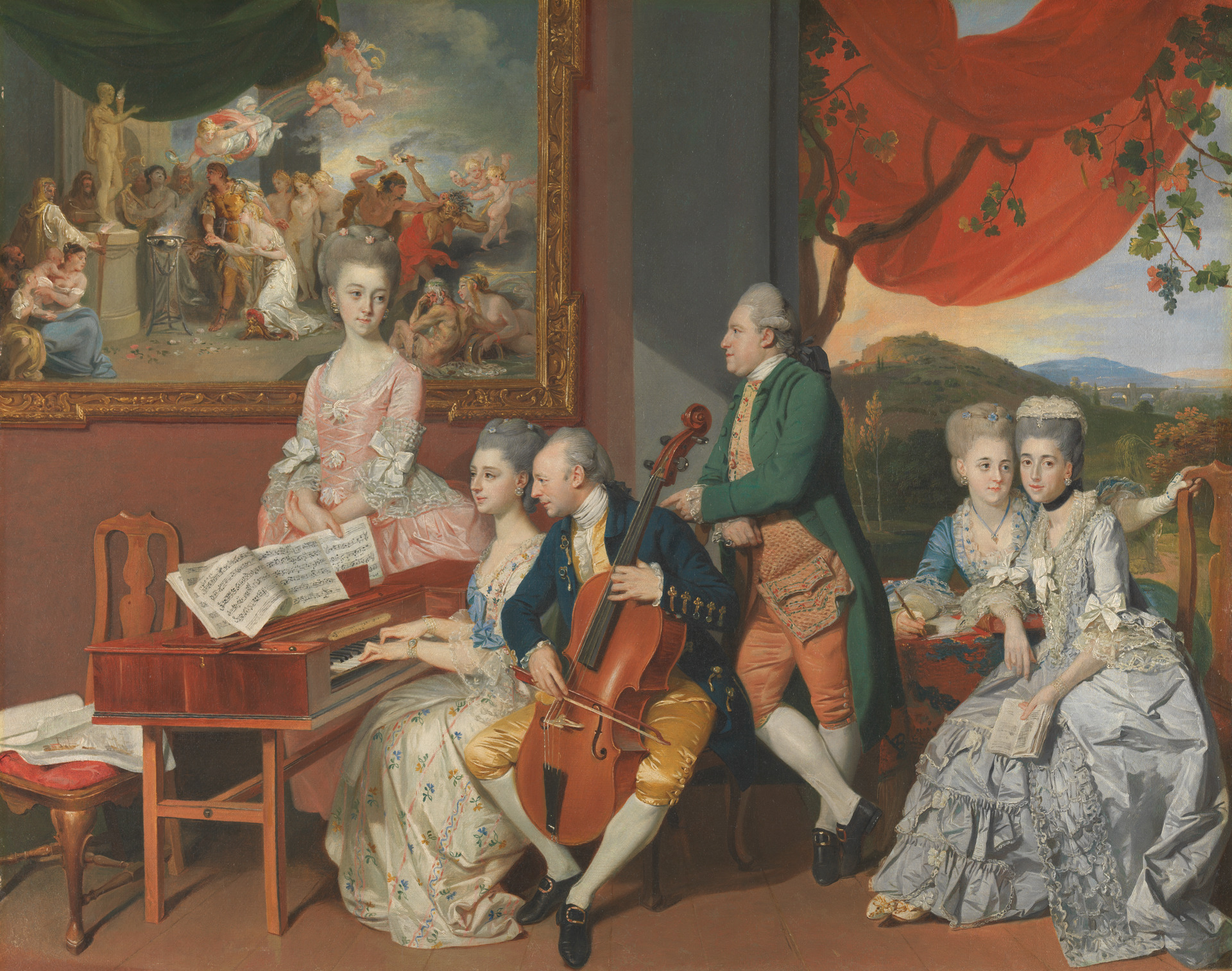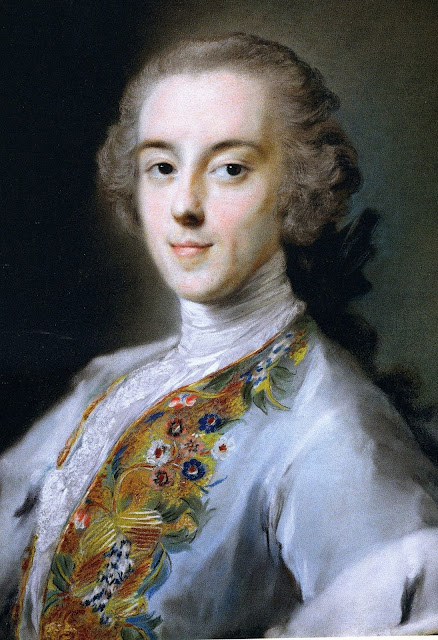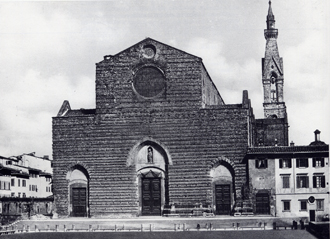|
George Clavering-Cowper, 3rd Earl Cowper
George Nassau Clavering-Cowper, 3rd Earl Cowper (1738 – 22 December 1789) was an English peer who went on the Grand Tour as a young man, but actually emigrated. Despite becoming a member of parliament and later inheriting lands and the title of Earl Cowper in England, he remained in Italy. He amassed a valuable art collection and became a Prince of the Holy Roman Empire. He was a patron of the arts and science. Biography George Nassau Clavering-Cowper was the son of the 2nd Earl Cowper and the godson of George II. Unlike other Grand Tourers, Fordwich was independent of his parents as he had inherited a fortune from his maternal grandfather in 1754. The tourers arrived in Florence on 7 July 1759. Fordwich's father was expectant of his return; he arranged for him to be elected as the Member of Parliament for Hertford in December 1759. However, Fordwich was establishing himself in Florentine society. By the following year his tutor, Jean Chastellain, asked for and was give ... [...More Info...] [...Related Items...] OR: [Wikipedia] [Google] [Baidu] |
The Right Honourable
''The Right Honourable'' (abbreviation: The Rt Hon. or variations) is an honorific Style (form of address), style traditionally applied to certain persons and collective bodies in the United Kingdom, the former British Empire, and the Commonwealth of Nations. The term is predominantly used today as a style associated with the holding of certain senior public offices in the United Kingdom, Canada, New Zealand, and, to a lesser extent, Australia. ''Right'' in this context is an adverb meaning 'very' or 'fully'. Grammatically, ''The Right Honourable'' is an adjectival phrase which gives information about a person. As such, it is not considered correct to apply it in direct address, nor to use it on its own as a title in place of a name; but rather it is used in the Grammatical person, third person along with a name or noun to be modified. ''Right'' may be abbreviated to ''Rt'', and ''Honourable'' to ''Hon.'', or both. ''The'' is sometimes dropped in written abbreviated form, but is ... [...More Info...] [...Related Items...] OR: [Wikipedia] [Google] [Baidu] |
JSTOR
JSTOR ( ; short for ''Journal Storage'') is a digital library of academic journals, books, and primary sources founded in 1994. Originally containing digitized back issues of academic journals, it now encompasses books and other primary sources as well as current issues of journals in the humanities and social sciences. It provides full-text searches of almost 2,000 journals. Most access is by subscription but some of the site is public domain, and open access content is available free of charge. History William G. Bowen, president of Princeton University from 1972 to 1988, founded JSTOR in 1994. JSTOR was originally conceived as a solution to one of the problems faced by libraries, especially research and university libraries, due to the increasing number of academic journals in existence. Most libraries found it prohibitively expensive in terms of cost and space to maintain a comprehensive collection of journals. By digitizing many journal titles, JSTOR allowed libraries ... [...More Info...] [...Related Items...] OR: [Wikipedia] [Google] [Baidu] |
Johan Zoffany - Tribuna Of The Uffizi - Google Art Project
{{disambiguation ...
Johan may refer to: * Johan (given name) * ''Johan'' (1921 film), a Swedish film directed by Mauritz Stiller * Johan (2005 film), a Dutch romantic comedy film * Johan (band), a Dutch pop-group ** ''Johan'' (album), a 1996 album by the group * Johan Peninsula, Ellesmere Island, Nunavut, Canada * Jo-Han, a manufacturer of plastic scale model kits See also * John (name) John ( ) is a common male name in the English language ultimately of Biblical Hebrew, Hebrew origin. The English form is from Middle English ''Ioon'', ''Ihon'', ''Iohn, Jan'' (mid-12c.), itself from Old French ''Jan'', ''Jean'', ''Jehan'' (Moder ... [...More Info...] [...Related Items...] OR: [Wikipedia] [Google] [Baidu] |
History Of Württemberg
History is the systematic study of the past, focusing primarily on the human past. As an academic discipline, it analyses and interprets evidence to construct narratives about what happened and explain why it happened. Some theorists categorize history as a social science, while others see it as part of the humanities or consider it a hybrid discipline. Similar debates surround the purpose of history—for example, whether its main aim is theoretical, to uncover the truth, or practical, to learn lessons from the past. In a more general sense, the term ''history'' refers not to an academic field but to the past itself, times in the past, or to individual texts about the past. Historical research relies on primary and secondary sources to reconstruct past events and validate interpretations. Source criticism is used to evaluate these sources, assessing their authenticity, content, and reliability. Historians strive to integrate the perspectives of several sources to devel ... [...More Info...] [...Related Items...] OR: [Wikipedia] [Google] [Baidu] |
Pinchbeck (alloy)
Pinchbeck is a form of brass, an alloy of copper and zinc mixed in proportions so that it closely resembles gold in appearance. It was invented in the early 18th century by Christopher Pinchbeck (died 1732), a London clock-and watch-maker. Since gold was only sold in 18-carat quality at that time, the development of pinchbeck allowed ordinary people to buy gold 'effect' jewellery on a budget. The inventor allegedly made pinchbeck jewellery clearly labelled as such. Pinchbeck jewellery was used in places like stagecoaches where there was a risk of theft. The original Pinchbeck was made by Christopher Pinchbeck and his descendants until the 1830s. Later dishonest jewellers passed pinchbeck off as gold; over the years the name came to mean a cheap and tawdry imitation of gold. Today, depending on the dealer, "Pinchbeck" can mean original Pinchbeck or any gilt metal. Pinchbeck fell out of use in the second half of the 19th century, being replaced by low-carat gold which had been ... [...More Info...] [...Related Items...] OR: [Wikipedia] [Google] [Baidu] |
Horace Walpole
Horatio Walpole, 4th Earl of Orford (; 24 September 1717 – 2 March 1797), better known as Horace Walpole, was an English Whig politician, writer, historian and antiquarian. He had Strawberry Hill House built in Twickenham, southwest London, reviving the Gothic style some decades before his Victorian successors. His literary reputation rests on the first Gothic novel, '' The Castle of Otranto'' (1764), and his ''Letters'', which are of significant social and political interest. They have been published by Yale University Press in 48 volumes. In 2017, a volume of Walpole's selected letters was published. The youngest son of the first British Prime Minister, Sir Robert Walpole, 1st Earl of Orford, he became the 4th and last Earl of Orford of the second creation on his nephew's death in 1791. Early life: 1717–1739 Walpole was born in London, the youngest son of British Prime Minister Sir Robert Walpole and his wife, Catherine. Like his father, he received early educatio ... [...More Info...] [...Related Items...] OR: [Wikipedia] [Google] [Baidu] |
Holy Roman Empire
The Holy Roman Empire, also known as the Holy Roman Empire of the German Nation after 1512, was a polity in Central and Western Europe, usually headed by the Holy Roman Emperor. It developed in the Early Middle Ages, and lasted for a millennium until its Dissolution of the Holy Roman Empire, dissolution in 1806 during the Napoleonic Wars. For most of its history the Empire comprised the entirety of the modern countries of Germany, Czechia, Austria, the Netherlands, Belgium, Switzerland, Slovenia, and Luxembourg, most of north-central Italy, and large parts of modern-day east France and west Poland. On 25 December 800, Pope Leo III crowned the Frankish king Charlemagne Roman emperor, reviving the title more than three centuries after the fall of the Western Roman Empire in 476. The title lapsed in 924, but was revived in 962 when Otto I, OttoI was crowned emperor by Pope John XII, as Charlemagne's and the Carolingian Empire's successor. From 962 until the 12th century, the empire ... [...More Info...] [...Related Items...] OR: [Wikipedia] [Google] [Baidu] |
Santa Croce, Florence
The ( Italian for 'Basilica of the Holy Cross') is a minor basilica and the principal Franciscan church of Florence, Italy. It is situated on the Piazza di Santa Croce, about 800 metres southeast of the Duomo, on what was once marshland beyond the city walls. Being the burial place of notable Italians, including those from the Italian Renaissance such as Michelangelo, Galileo, and Machiavelli, as well as the poet Foscolo, political philosopher Gentile and the composer Rossini, it is also known as the Temple of the Italian Glories (). Building The basilica is the largest Franciscan church in the world. Its most notable features are its sixteen chapels, many of them decorated with frescoes by Giotto and his pupils, and its tombs and cenotaphs. Legend says that Santa Croce was founded by St Francis himself. The construction of the current church, to replace an older building, was begun on 12 May 1294, possibly by Arnolfo di Cambio, and paid for by some of the city's wealthi ... [...More Info...] [...Related Items...] OR: [Wikipedia] [Google] [Baidu] |
List Of Diplomats From The United Kingdom To The Grand Duchy Of Tuscany
A list is a Set (mathematics), set of discrete items of information collected and set forth in some format for utility, entertainment, or other purposes. A list may be memorialized in any number of ways, including existing only in the mind of the list-maker, but lists are frequently written down on paper, or maintained electronically. Lists are "most frequently a tool", and "one does not ''read'' but only ''uses'' a list: one looks up the relevant information in it, but usually does not need to deal with it as a whole".Lucie Doležalová,The Potential and Limitations of Studying Lists, in Lucie Doležalová, ed., ''The Charm of a List: From the Sumerians to Computerised Data Processing'' (2009). Purpose It has been observed that, with a few exceptions, "the scholarship on lists remains fragmented". David Wallechinsky, a co-author of ''The Book of Lists'', described the attraction of lists as being "because we live in an era of overstimulation, especially in terms of information, ... [...More Info...] [...Related Items...] OR: [Wikipedia] [Google] [Baidu] |
Sir Horace Mann, 1st Baronet
Sir Horace (Horatio) Mann, 1st Baronet Order of the Bath, KB (8 August 1706 – 6 November 1786), was a long-standing Kingdom of Great Britain, British resident and diplomat in Florence. Life and career Mann was the second son of Robert Mann (1678–1751), a successful City of London, London merchant, and his wife, Eleanor Guise Mann. He was baptised at St Martin's in the Fields, Middlesex, on 22 August 1706, brought up in Chelsea, London, Chelsea, and educated at Eton College and later, briefly, at Clare College, Cambridge. Suffering from poor health, he travelled on the continent in the 1730s. In February 1737, he was appointed as secretary to Charles Fane, 2nd Viscount Fane, Charles Fane, the British Minister at Florence. He then served as Kingdom of Great Britain, British diplomatic representative there to the Grand Duke of Tuscany, Grand Dukes of Tuscany for the rest of his life. In the course of his long diplomatic career, he was Chargé d'affaires in 1738-1740; Ministe ... [...More Info...] [...Related Items...] OR: [Wikipedia] [Google] [Baidu] |
Fiesole
Fiesole () is a town and ''comune'' of the Metropolitan City of Florence in the Italian region of Tuscany, on a scenic height above Florence, 5 km (3 miles) northeast of that city. It has structures dating to Etruscan and Roman times. Founded in the seventh century BC as Vipsul, the city became one of the most important and earliest urban centres of the Etruscan civilisation. Since the fourteenth century, the city has always been considered a getaway for members of the upper class of Florence and, up to this day, Fiesole remains noted for its very expensive residential properties, just as well as its centuries-old villas and their formal gardens. The city is generally considered to be the wealthiest and most affluent suburb of Florence. In 2016, the city had the highest median family income in the whole of Tuscany. Fiesole is a centre of higher education. The campus of the European University Institute is situated in the suburb and uses several historical buildings in ... [...More Info...] [...Related Items...] OR: [Wikipedia] [Google] [Baidu] |







